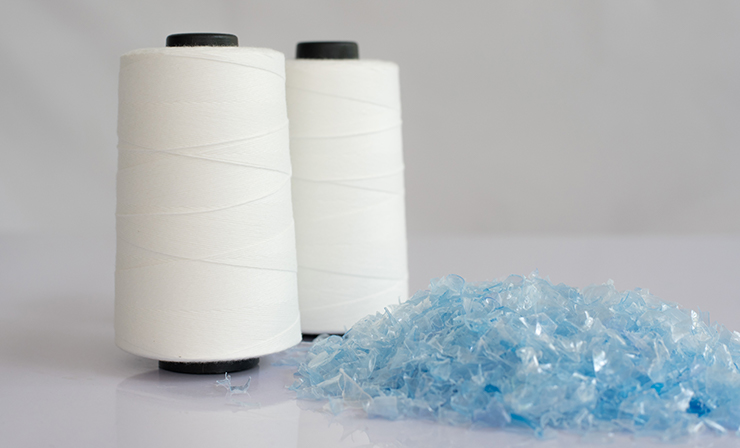All the benefits of polyester with a smaller carbon footprint: recycled polyester is an increasingly utilized material in the construction of garments across all textile sectors, including in the protective workwear industry. From its environmental benefits to its versatility, recycled polyester is poised to help transform sustainability in garment manufacturing and aid in building a greener future for us all. But first, what exactly is recycled polyester?
What is recycled polyester?
Recycled polyester fibers are extracted from post-consumer and/or post-industrial waste products, such as recycled plastic bottles (PET). Transforming what would otherwise be considered waste into something new and useful is a huge win, both in diverting that waste from landfills and the environment, and in being a less environmentally taxing material to create compared to virgin polyester.
Compared to virgin polyester, recycled polyester offers almost all the same properties, but with significant sustainability gains. Like virgin polyester, recycled polyester is:
- Durable
- Lightweight
- Crease-resistant
- Colorfast
- Quick drying
- Stain-resistant
Plus, unlike virgin polyester, it’s eco-friendly and economical. Its fabric properties make it exceptionally versatile, which is evident from how many industries use it: from home textiles to fashion, sports, and outdoor clothing, just to name a few. At TenCate Protective Fabrics, we use recycled polyester in our Ecogreen portfolio, which comprises sustainable fabrics for any industry.
Sustainable, durable, & economical: the advantages of recycled polyester
Recycled materials like recycled polyester are a critical component of eco-designs and help support global goals for climate change mitigation strategies such as the UN’s 2030 Agenda for Sustainable Development. Just this year, governments across the APAC region at the 79th session of the Economic and Social Commission for Asia and the Pacific (ESCAP) endorsed and adopted several resolutions aimed at achieving Sustainable Development Goals, including a recommitment to immediately curb greenhouse gas emissions. Using recycled materials in garment manufacturing is one strategy that supports these endeavors.
Two crucial advantages of recycled polyester over virgin polyester is the reduction of plastic bottles in landfills and the reduced use of petroleum, which is used in the creation of virgin polyester. Reusing plastic bottles in the fiber production process and reducing the use of petroleum are major benefits for reducing environmental contamination as well as water and air pollution.
Recycled polyester also offers huge energy savings (up to 45%) in the fiber production process compared to virgin polyester, as well as a 20% reduction in water consumption and 30% less CO2 emissions.
How it’s made
At TenCate Protective Fabrics, the recycled polyester fiber we use is mechanically produced, meaning no chemicals are used in the production process—another big win for the environment. We use REPREVE® recycled polyester fibers in our fabric, which have tracer technology embedded into the fibers, allowing REPREVE®’s FiberPrint Tracer to test any fabric to verify that it is REPREVE® fiber and in the required quantities.
The REPREVE® fibers we use are made from 80% recycled plastic bottles (post-consumer waste) and 20% waste from polyester production (post-industrial waste), which is collected, washed, and chopped up into small bits called ‘flake.’ These flakes are then melted down and formed into usable chips, which are again melted and made into fibers for the textile industry.
Ensuring fabric content
Many garment manufacturers claim to use 100% recycled polyester in their fabrics, but unfortunately this is not always the case. Their fabric may indeed include recycled polyester, but the overall percentage that some companies use is very often limited. Moreover, it is often mixed with virgin polyester in a blend. True 100% recycled polyester in garment fabrics is what we strive for to improve sustainability and become more eco-friendly.
How do you know if you’re holding a garment with 100% recycled polyester content? You can’t always know based on the label, even if it states that the fabric comprises recycled polyester. A lower fabric price is often an indication that it is in fact a virgin blend.
You can also check to see if the fabric is certified. At TenCate Protective Fabrics, our 100% recycled polyester fibers are certified according to the Global Recycled Standard (GRS) and Scientific Certification System (SCS). GRS and SCS are neutral third parties ensuring claims for recycled products. You can check the percentage of recycled polyester content, as well as the controlled feedstock in their certification reports. Both standards indicate that mechanical recycled polyester fiber is made from recycled materials.
As mentioned above, our REPREVE® fibers can be tested to verify the fiber identity and quantity, allowing you to be certain that the fibers are produced with 100% recycled content. Our sustainable protective and workwear fabrics designed with recycled polyester content are available with verified lifecycle data and an Environmental Product Declaration (EPD®) according to ISO 14025. EPD®s are becoming an industry standard and support the SDGs of the UN by proving products’ carbon footprints.
Weave sustainability into your workwear
Interested in incorporating recycled polyester as a sustainable option for your workwear fabric? Contact us for more information here.


.png?width=1080&name=Article%20image%20(2).png)



.png?width=399&name=Untitled%20design%20(50).png)
.png?width=399&name=Untitled%20design%20(37).png)

